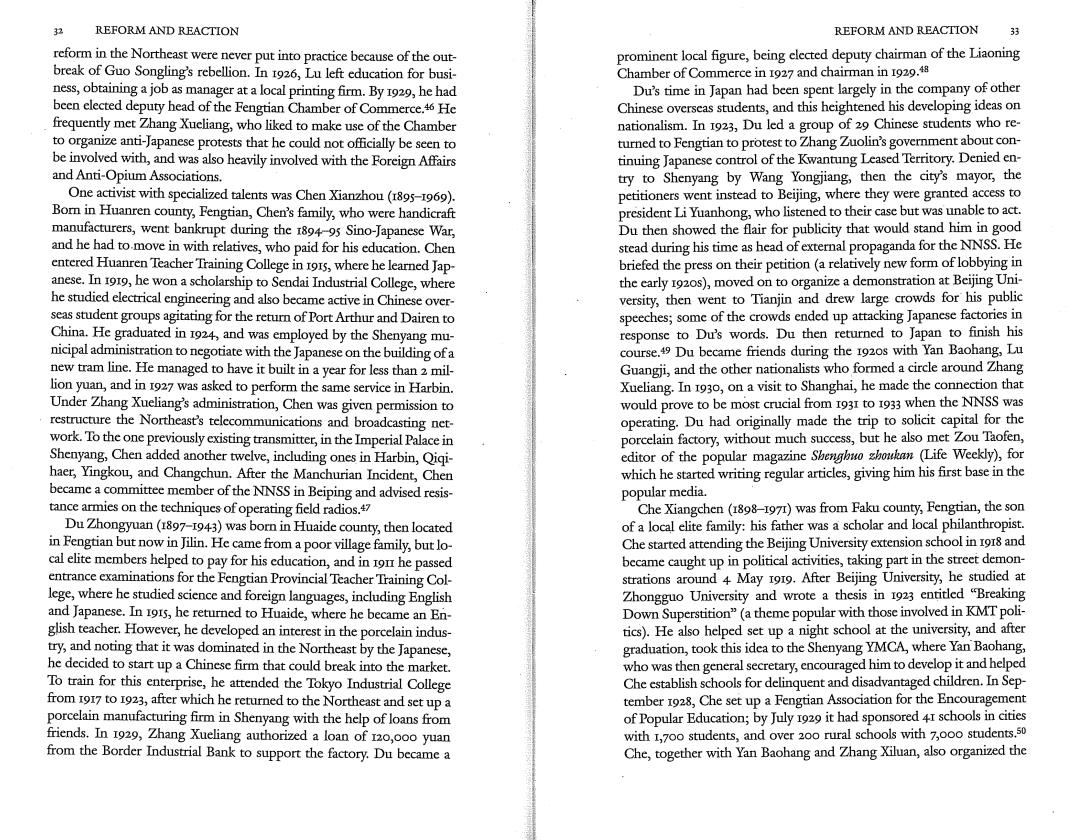
32 REFORM AND REACTION REFORM AND REACTION 33 reform in the Northeast were never put into practice because of the out- prominent local figure,being elected deputy chairman of the Liaoning break of Guo Songling's rebellion.In 1926,Lu left education for busi- Chamber of Commerce in 1927 and chairman in 1929.8 ness,obtaining a job as manager at a local printing firm.By 1929,he had Du's time in Japan had been spent largely in the company of other been elected deputy head of the Fengtian Chamber of Commerce.46 He Chinese overseas students,and this heightened his developing ideas on frequently met Zhang Xucliang,who liked to make use of the Chamber nationalism.In 1923,Du led a group of 29 Chinese students who re- to organize anti-Japanese protests that he could not officially be seen to turned to Fengtian to protest to Zhang Zuolin's government about con- be involved with,and was also heavily involved with the Foreign Affairs tinuing Japanese control of the Kwantung Leased Territory.Denied en- and Anti-Opium Associations. try to Shenyang by Wang Yongjiang,then the city's mayor,the One activist with specialized talents was Chen Xianzhou (1895-1969). petitioners went instead to Beijing,where they were granted access to Born in Huanren county,Fengtian,Chen's family,who were handicraft president Li Yuanhong,who listened to their case but was unable to act. manufacturers,went bankrupt during the 1894-95 Sino-Japanese War, Du then showed the flair for publicity that would stand him in good and he had to.move in with relatives,who paid for his education.Chen stead during his time as head of external propaganda for the NNSS.He entered Huanren Teacher Training College in rors,where he learned Jap- briefed the press on their petition(a relatively new form of lobbying in anese.In 1or9,he won a scholarship to Sendai Industrial College,where the early I92os),moved on to organize a demonstration at Beijing Uni- he studied electrical engineering and also became active in Chinese over- versity,then went to Tianjin and drew large crowds for his public seas student groups agitating for the return of Port Arthur and Dairen to speeches;some of the crowds ended up attacking Japanese factories in China.He graduated in 1924,and was employed by the Shenyang mu- response to Du's words.Du then returned to Japan to finish his nicipal administration to negotiate with the Japanese on the building of a course.49 Du became friends during the 192os with Yan Baohang,Lu new tram line.He managed to have it built in a year for less than 2 mil- Guangji,and the other nationalists who formed a circle around Zhang lion yuan,and in 1927 was asked to perform the same service in Harbin. Xueliang.In 1930,on a visit to Shanghai,he made the connection that Under Zhang Xueliang's administration,Chen was given permission to would prove to be most crucial from I93I to 1933 when the NNSS was restructure the Northeast's telecommunications and broadcasting net- operating.Du had originally made the trip to solicit capital for the work.To the one previously existing transmitter,in the Imperial Palace in porcelain factory,without much success,but he also met Zou Taofen, Shenyang,Chen added another twelve,including ones in Harbin,Qiqi- editor of the popular magazine Shengbuo zhoukan (Life Weekly),for haer,Yingkou,and Changchun.After the Manchurian Incident,Chen which he started writing regular articles,giving him his first base in the became a committee member of the NNSS in Beiping and advised resis- popular media. tance armies on the techniques of operating field radios.47 Che Xiangchen (1898-197r)was from Faku county,Fengtian,the son Du Zhongyuan(1897-1943)was born in Huaide county,then located of a local elite family:his father was a scholar and local philanthropist. in Fengtian but now in Jilin.He came from a poor village family,but lo- Che started attending the Beijing University extension school in I9r8 and cal elite members helped to pay for his education,and in rom he passed became caught up in political activities,taking part in the street demon- entrance examinations for the Fengtian Provincial Teacher Training Col- strations around 4 May I919.After Beijing University,he studied at lege,where he studied science and foreign languages,including English Zhongguo University and wrote a thesis in 1923 entitled "Breaking and Japanese.In I9Is,he returned to Huaide,where he became an En- Down Superstition"(a theme popular with those involved in KMT poli- glish teacher.However,he developed an interest in the porcelain indus- tics).He also helped set up a night school at the university,and after try,and noting that it was dominated in the Northeast by the Japanese, graduation,took this idea to the Shenyang YMCA,where Yan Baohang, he decided to start up a Chinese firm that could break into the market. who was then general secretary,encouraged him to develop it and helped To train for this enterprise,he attended the Tokyo Industrial College Che establish schools for delinquent and disadvantaged children.In Sep- from 1917 to 1923,after which he returned to the Northeast and set up a tember 1928,Che set up a Fengtian Association for the Encouragement porcelain manufacturing firm in Shenyang with the help of loans from of Popular Education;by July 1929 it had sponsored 4I schools in cities friends.In 1929,Zhang Xueliang authorized a loan of I2o,ooo yuan with I,7oo students,and over 2oo rural schools with 7,oo0 students.50 from the Border Industrial Bank to support the factory.Du became a Che,together with Yan Baohang and Zhang Xiluan,also organized the
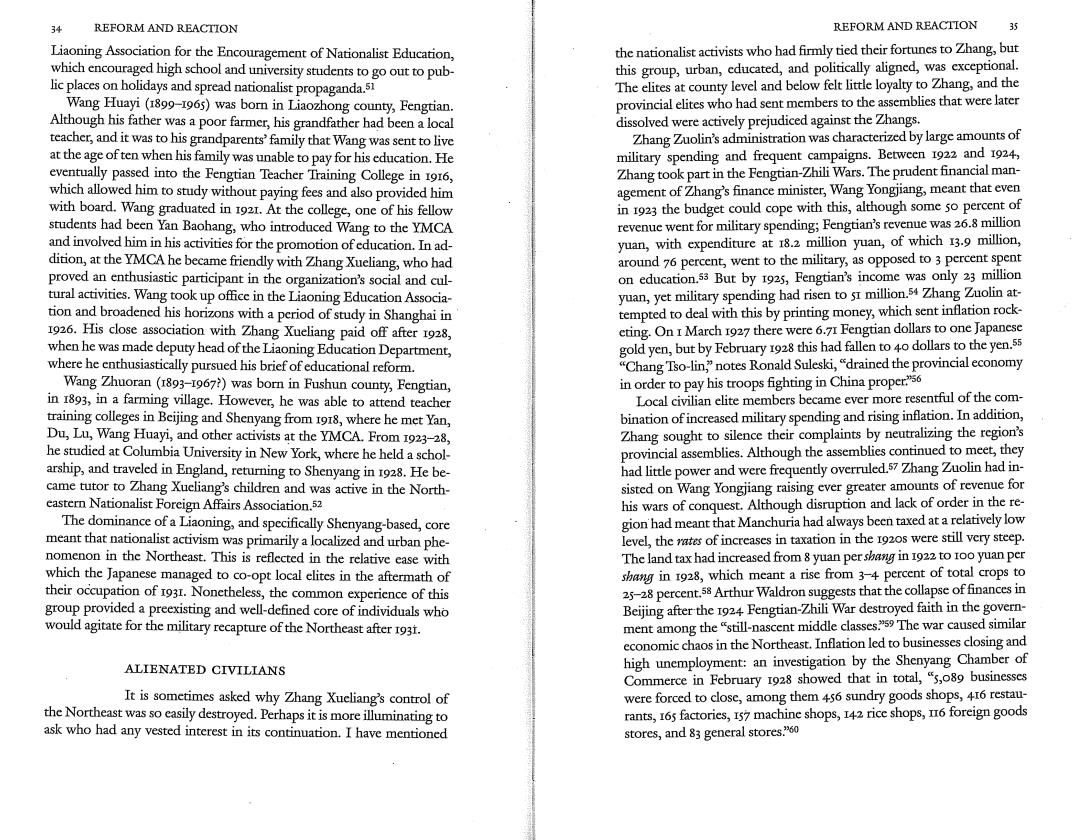
34 REFORM AND REACTION REFORM AND REACTION 35 Liaoning Association for the Encouragement of Nationalist Education, the nationalist activists who had firmly tied their fortunes to Zhang,but which encouraged high school and university students to go out to pub- this group,urban,educated,and politically aligned,was exceptional. lic places on holidays and spread nationalist propaganda.51 The elites at county level and below felt little loyalty to Zhang,and the Wang Huayi(1899-1965)was born in Liaozhong county,Fengtian. provincial elites who had sent members to the assemblies that were later Although his father was a poor farmer,his grandfather had been a local dissolved were actively prejudiced against the Zhangs. teacher,and it was to his grandparents'family that Wang was sent to live Zhang Zuolin's administration was characterized by large amounts of at the age of ten when his family was unable to pay for his education.He military spending and frequent campaigns.Between 1922 and 1924, eventually passed into the Fengtian Teacher Training College in I916, Zhang took part in the Fengtian-Zhili Wars.The prudent financial man- which allowed him to study without paying fees and also provided him agement of Zhang's finance minister,Wang Yongjiang,meant that even with board.Wang graduated in 1921.At the college,one of his fellow in 1923 the budget could cope with this,although some so percent of students had been Yan Baohang,who introduced Wang to the YMCA revenuc went for military spending;Fengtian's revenue was 26.8 million and involved him in his activities for the promotion of education.In ad- yuan,with expenditure at 18.2 million yuan,of which 13.9 million, dition,at the YMCA he became friendly with Zhang Xueliang,who had around 76 percent,went to the military,as opposed to 3 percent spent proved an enthusiastic participant in the organization's social and cul- on education.53 But by 1925,Fengtian's income was only 23 million tural activities.Wang took up office in the Liaoning Education Associa- yuan,yet military spending had risen to sI million.54 Zhang Zuolin at- tion and broadened his horizons with a period of study in Shanghai in tempted to deal with this by printing money,which sent inflation rock- 1926.His close association with Zhang Xueliang paid off after 1928, eting.On I March 1927 there were 6.7I Fengtian dollars to one Japanese when he was made deputy head of the Liaoning Education Department, gold yen,but by February 1928 this had fallen to 4o dollars to the yen.55 where he enthusiastically pursued his brief of educational reform. "Chang Tso-lin,notes Ronald Suleski,"drained the provincial economy Wang Zhuoran(1893-1967?)was born in Fushun county,Fengtian, in order to pay his troops fighting in China proper in 1893,in a farming village.However,he was able to attend teacher Local civilian elite members became ever more resentful of the com- training colleges in Beijing and Shenyang from 1918,where he met Yan, bination of increased military spending and rising inflation.In addition, Du,Lu,Wang Huayi,and other activists at the YMCA.From 1923-28, Zhang sought to silence their complaints by neutralizing the region's he studied at Columbia University in New York,where he held a schol- provincial assemblies.Although the assemblies continued to meet,they arship,and traveled in England,returning to Shenyang in 1928.He be- had little power and were frequently overruled.s7 Zhang Zuolin had in- came tutor to Zhang Xucliang's children and was active in the North- sisted on Wang Yongjiang raising ever greater amounts of revenue for eastern Nationalist Foreign Affairs Association.52 his wars of conquest.Although disruption and lack of order in the re- The dominance of a Liaoning,and specifically Shenyang-based,core gion had meant that Manchuria had always been taxed at a relatively low meant that nationalist activism was primarily a localized and urban phe- level,the rates of increases in taxation in the Igzos were still very steep. nomenon in the Northeast.This is reflected in the relative ease with The land tax had increased from 8 yuan per shang in 1922 to roo yuan per which the Japanese managed to co-opt local elites in the aftermath of shang in 1928,which meant a rise from 3-4 percent of total crops to their occupation of 1931.Nonetheless,the common experience of this 25-28 percent.s8 Arthur Waldron suggests that the collapse of finances in group provided a preexisting and well-defined core of individuals who Beijing after the 1924 Fengtian-Zhili War destroyed faith in the govern- would agitate for the military recapture of the Northeast after 1931. ment among the"still-nascent middle classes.59 The war caused similar economic chaos in the Northeast.Inflation led to businesses closing and ALIENATED CIVILIANS high unemployment:an investigation by the Shenyang Chamber of Commerce in February 1928 showed that in total,"s,o89 businesscs It is sometimes asked why Zhang Xueliang's control of were forced to close,among them 456 sundry goods shops,416 restau- the Northeast was so easily destroyed.Perhaps it is more illuminating to rants,I6s factories,Is7 machine shops,142 rice shops,I6 foreign goods ask who had any vested interest in its continuation.I have mentioned stores,and 83 general stores.60
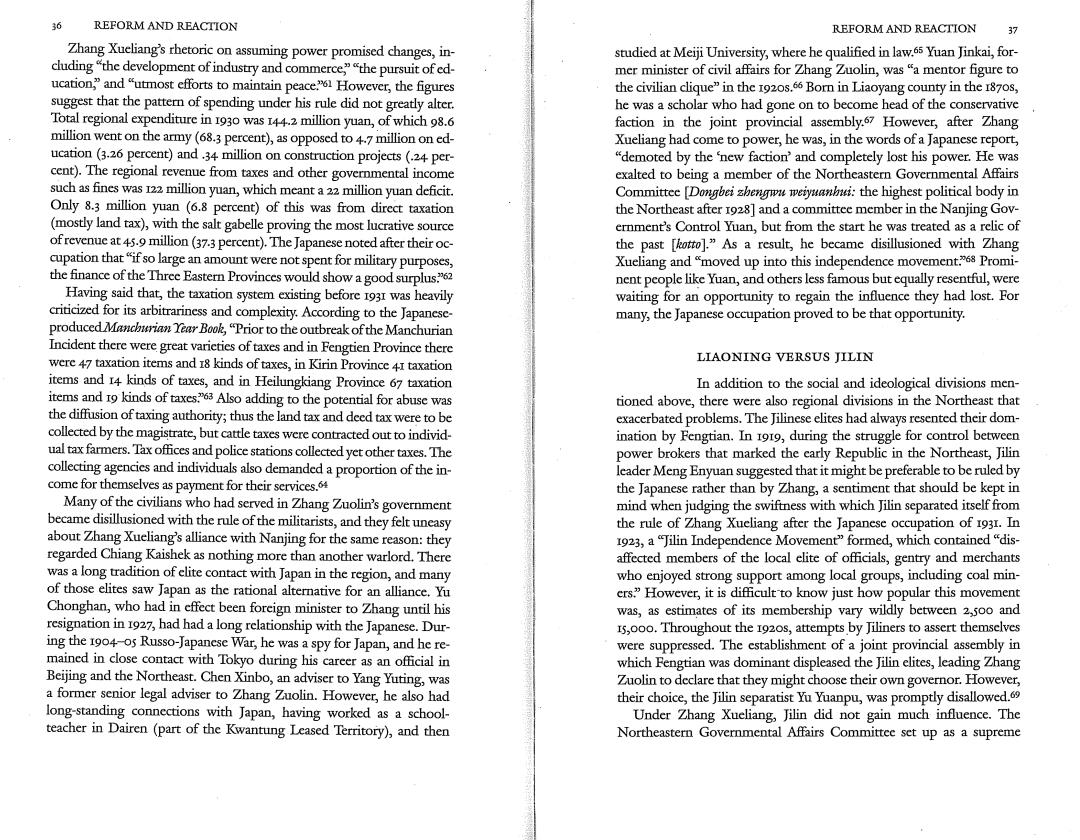
6 REFORM AND REACTION REFORM AND REACTION Zhang Xueliang's rhetoric on assuming power promised changes,in- studied at Meiji University,where he qualified in law.65 Yuan Jinkai,for- cluding"the development of industry and commercethe pursuit of ed- mer minister of civil affairs for Zhang Zuolin,was "a mentor figure to ucation,and "utmost efforts to maintain peace.However,the figures the civilian clique"in the 1920s.66 Born in Liaoyang county in the r87os, suggest that the pattern of spending under his rule did not greatly alter. he was a scholar who had gone on to become head of the conservative Total regional expenditure in 1930 was 144.2 million yuan,of which 98.6 faction in the joint provincial assembly.67 However,after Zhang million went on the army(68.3 percent),as opposed to 47 million on ed- Xueliang had come to power,he was,in the words of a Japanese report, ucation (3.26 percent)and.34 million on construction projects (.24 per- "demoted by the new faction'and completely lost his power.He was cent).The regional revenue from taxes and other governmental income exalted to being a member of the Northeastern Governmental Affairs such as fines was 122 million yuan,which meant a 22 million yuan deficit. Committce [Dongbei zhengu weiyuanhii:the highest political body in Only 8.3 million yuan(6.8 percent)of this was from direct taxation the Northeast after 1928]and a committee member in the Nanjing Gov- (mostly land tax),with the salt gabelle proving the most lucrative source ernment's Control Yuan,but from the start he was treated as a relic of of revenue at 45.9 million(37.3 percent).The Japanese noted after their oc- the past [kotto]."As a result,he became disillusioned with Zhang cupation that"if so large an amount were not spent for military purposes, Xueliang and moved up into this independence movement 68 Promi- the finance of the Three Eastern Provinces would show a good surplus:"62 nent people like Yuan,and others less famous but equally resentful,were Having said that,the taxation system existing before r93r was heavily waiting for an opportunity to regain the influence they had lost.For criticized for its arbitrariness and complexity.According to the Japanese- many,the Japanese occupation proved to be that opportunity. produced Manchirian Year Book,"Prior to the outbreak of the Manchurian Incident there were great varieties of taxes and in Fengtien Province there were 47 taxation items and 18 kinds of taxes,in Kirin Province 4I taxation LIAONING VERSUS JILIN items and 14 kinds of taxes,and in Heilungkiang Province 67 taxation In addition to the social and ideological divisions men- items and Io kinds of taxes:63 Also adding to the potential for abuse was tioned above,there were also regional divisions in the Northeast that the diffusion of taxing authority;thus the land tax and deed tax were to be exacerbated problems.The Jilinese elites had always resented their dom- collected by the magistrate,but cattle taxes were contracted out to individ- ination by Fengtian.In 1919,during the struggle for control between ual tax farmers.Tax offices and police stations collected yet other taxes.The power brokers that marked the carly Republic in the Northeast,Jilin collecting agencics and individuals also demanded a proportion of the in- leader Meng Enyuan suggested that it might be preferable to be ruled by come for themselves as payment for their services.64 the Japanese rather than by Zhang,a sentiment that should be kept in Many of the civilians who had served in Zhang Zuolin's government mind when judging the swiftness with which Jilin separated itself from became disillusioned with the rule of the militarists,and they felt uneasy the rule of Zhang Xueliang after the Japanese occupation of I931.In about Zhang Xueliang's alliance with Nanjing for the same reason:they 1923,a "Jilin Independence Movement"formed,which contained "dis- regarded Chiang Kaishek as nothing more than another warlord.There affected members of the local elite of officials,gentry and merchants was a long tradition of elite contact with Japan in the region,and many who enjoyed strong support among local groups,including coal min- of those elites saw Japan as the rational alternative for an alliance.Yu ers"However,it is difficult to know just how popular this movement Chonghan,who had in effect been foreign minister to Zhang until his was,as estimates of its membership vary wildly between 2,soo and resignation in 1927,had had a long relationship with the Japanese.Dur- I5,ooo.Throughout the I9zos,attempts by Jiliners to assert themselves ing the 1904-os Russo-Japancse War,he was a spy for Japan,and he re- were suppressed.The establishment of a joint provincial assembly in mained in close contact with Tokyo during his career as an official in which Fengtian was dominant displeased the Jilin elites,leading Zhang Beijing and the Northeast.Chen Xinbo,an adviser to Yang Yuting,was Zuolin to declare that they might choose their own governor.However, a former senior legal adviser to Zhang Zuolin.However,he also had their choice,the Jilin separatist Yu Yuanpu,was promptly disallowed.9 long-standing connections with Japan,having worked as a school- Under Zhang Xueliang,Jilin did not gain much influence.The teacher in Dairen (part of the Kwantung Leased Territory),and then Northeastern Governmental Affairs Committee set up as a supreme
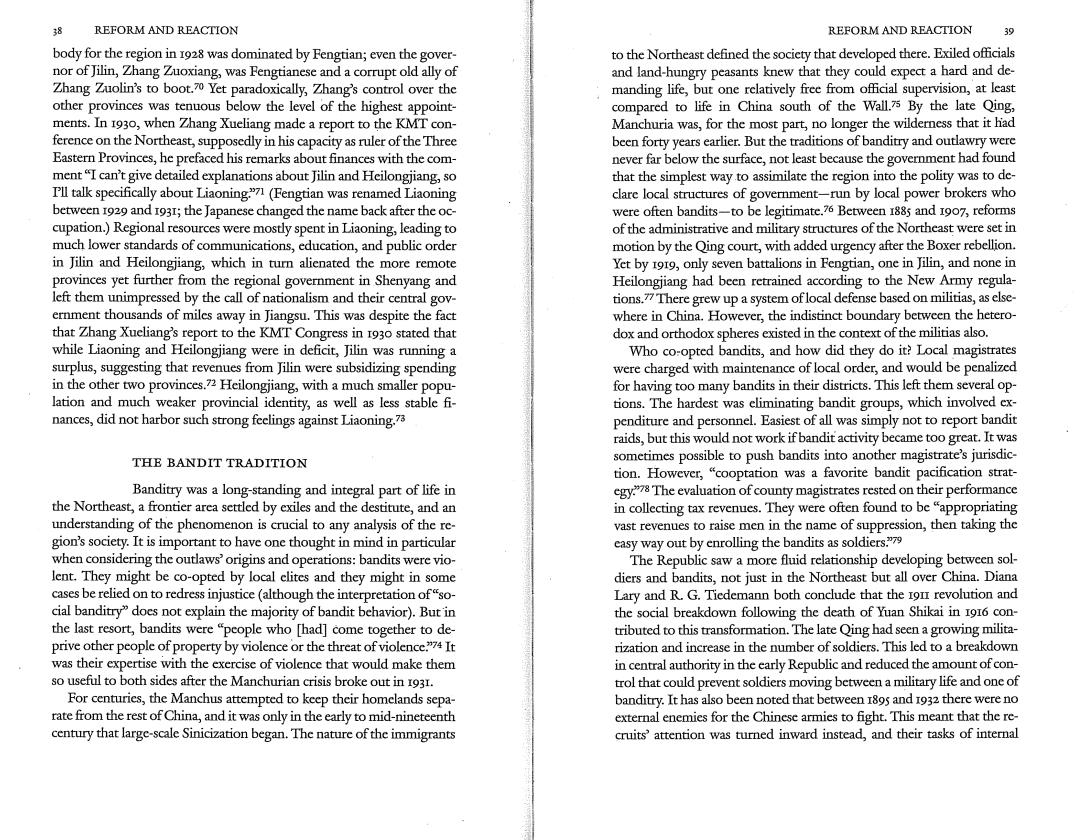
38 REFORM AND REACTION REFORM AND REACTION 39 body for the region in 1928 was dominated by Fengtian;even the gover- to the Northeast defined the society that developed there.Exiled officials nor of Jilin,Zhang Zuoxiang,was Fengtianese and a corrupt old ally of and land-hungry peasants knew that they could expect a hard and de- Zhang Zuolin's to boot.70 Yet paradoxically,Zhang's control over the manding life,but one relatively free from official supervision,at least other provinces was tenuous below the level of the highest appoint- compared to life in China south of the Wall.75 By the late Qing, ments.In 1930,when Zhang Xueliang made a report to the KMT con- Manchuria was,for the most part,no longer the wilderness that it had ference on the Northeast,supposedly in his capacity as ruler of the Three been forty years earlier.But the traditions of banditry and outlawry were Eastern Provinces,he prefaced his remarks about finances with the com- never far below the surface,not least because the government had found ment "I can't give detailed explanations about Jilin and Heilongjiang,so that the simplest way to assimilate the region into the polity was to de- Ill talk specifically about Liaoning:71(Fengtian was renamed Liaoning clare local structures of government-run by local power brokers who between 1929 and 193I;the Japanese changed the name back after the oc- were often bandits-to be legitimate.76 Between 1885 and 1907,reforms cupation.)Regional resources were mostly spent in Liaoning,leading to of the administrative and military structures of the Northeast were set in much lower standards of communications,education,and public order motion by the Qing court,with added urgency after the Boxer rebellion. in Jilin and Heilongjiang,which in turn alienated the more remote Yet by 19r9,only seven battalions in Fengtian,one in Jilin,and none in provinces yet further from the regional government in Shenyang and Heilongjiang had been retrained according to the New Army regula- left them unimpressed by the call of nationalism and their central gov- tions.77 There grew up a system oflocal defense based on militias,as else- ernment thousands of miles away in Jiangsu.This was despite the fact where in China.However,the indistinct boundary between the hetero- that Zhang Xueliang's report to the KMT Congress in 1930 stated that dox and orthodox spheres existed in the context of the militias also. while Liaoning and Heilongjiang were in deficit,Jilin was running a Who co-opted bandits,and how did they do it?Local magistrates surplus,suggesting that revenues from Jilin were subsidizing spending were charged with maintenance of local order,and would be penalized in the other two provinces.72 Heilongjiang,with a much smaller popu- for having too many bandits in their districts.This left them several op- lation and much weaker provincial identity,as well as less stable fi- tions.The hardest was eliminating bandit groups,which involved ex- nances,did not harbor such strong feelings against Liaoning.73 penditure and personnel.Easiest of all was simply not to report bandit raids,but this would not work if bandit activity became too great.It was THE BANDIT TRADITION sometimes possible to push bandits into another magistrate's jurisdic- tion.However,"cooptation was a favorite bandit pacification strat- Banditry was a long-standing and integral part of life in egy."78 The evaluation of county magistrates rested on their performance the Northeast,a frontier area settled by exiles and the destitute,and an in collecting tax revenues.They were often found to be "appropriating understanding of the phenomenon is crucial to any analysis of the re- vast revenues to raise men in the name of suppression,then taking the gion's society.It is important to have one thought in mind in particular easy way out by enrolling the bandits as soldiers.79 when considering the outlawsorigins and operations:bandits were vio- The Republic saw a more fluid relationship developing between sol- lent.They might be co-opted by local elites and they might in some diers and bandits,not just in the Northeast but all over China.Diana cases be relied on to redress injustice(although the interpretation of"so- Lary and R.G.Tiedemann both conclude that the rom revolution and cial banditry does not explain the majority of bandit behavior).But in the social breakdown following the death of Yuan Shikai in 19I6 con- the last resort,bandits were "people who [had]come together to de- tributed to this transformation.The late Qing had seen a growing milita- prive other people of property by violence or the threat of violence.74 It rization and increase in the number of soldiers.This led to a breakdown was their expertise with the exercise of violence that would make them in central authority in the early Republic and reduced the amount of con- so useful to both sides after the Manchurian crisis broke out in 1931. trol that could prevent soldiers moving between a military life and one of For centuries,the Manchus attempted to keep their homelands sepa- banditry.It has also been noted that between 189 and 1932 there were no rate from the rest of China,and it was only in the early to mid-nineteenth external enemies for the Chinese armies to fight.This meant that the re- century that large-scale Sinicization began.The nature of the immigrants cruits'attention was turned inward instead,and their tasks of internal
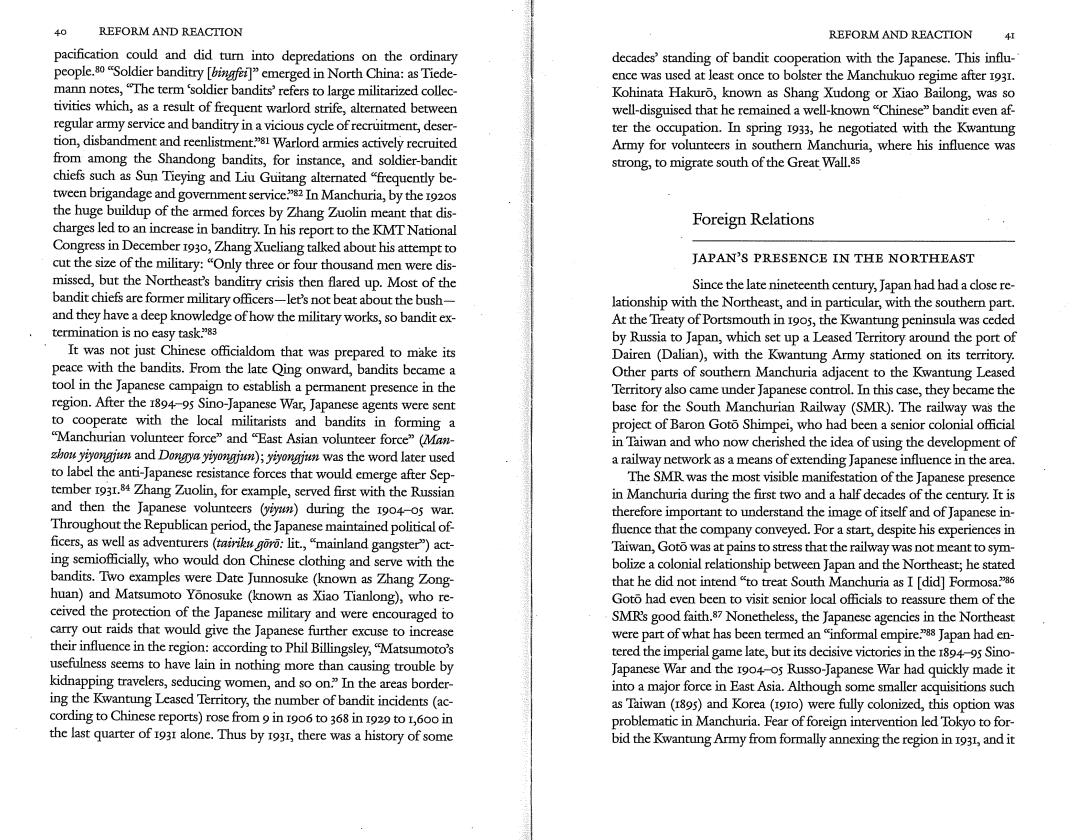
REFORM AND REACTION REFORM AND REACTION 4 pacification could and did turn into depredations on the ordinary decades'standing of bandit cooperation with the Japanese.This influ- people.80"Soldier banditry []emerged in North China:as Tiede- ence was used at least once to bolster the Manchukuo regime after 193I. mann notes,"The term soldier bandits'refers to large militarized collec- Kohinata Hakuro,known as Shang Xudong or Xiao Bailong,was so tivities which,as a result of frequent warlord strife,alternated between well-disguised that he remained a well-known"Chinese"bandit even af- regular army service and banditry in a vicious cycle of recruitment,deser- ter the occupation.In spring 1933,he negotiated with the Kwantung tion,disbandment and reenlistment:81 Warlord armies actively recruited Army for volunteers in southern Manchuria,where his influence was from among the Shandong bandits,for instance,and soldier-bandit strong,to migrate south of the Great Wall.85 chiefs such as Sun Tieying and Liu Guitang alternated "frequcntly be- tween brigandage and government service"82 In Manchuria,by the Igzos the huge buildup of the armed forces by Zhang Zuolin meant that dis- charges led to an increase in banditry.In his report to the KMT National Foreign Relations Congress in December 1930,Zhang Xueliang talked about his attempt to cut the size of the military:"Only three or four thousand men were dis- JAPAN'S PRESENCE IN THE NORTHEAST missed,but the Northeast's banditry crisis then flared up.Most of the Since the late nineteenth century,Japan had had a close re- bandit chiefs are former military officers-let's not beat about the bush- lationship with the Northeast,and in particular,with the southern part. and they have a deep knowledge of how the military works,so bandit ex- At the Treaty of Portsmouth in 19o5,the Kwantung peninsula was ceded termination is no easy task:83 by Russia to Japan,which set up a Leased Territory around the port of It was not just Chinese officialdom that was prepared to make its Dairen (Dalian),with the Kwantung Army stationed on its territory. peace with the bandits.From the late Qing onward,bandits became a Other parts of southern Manchuria adjacent to the Kwantung Leased tool in the Japanese campaign to establish a permanent presence in the Territory also came under Japanese control.In this case,they became the region.After the 1894-95 Sino-Japanese War,Japanese agents were sent base for the South Manchurian Railway (SMR).The railway was the to cooperate with the local militarists and bandits in forming a project of Baron Goto Shimpei,who had been a senior colonial official "Manchurian volunteer force"and "East Asian volunteer force"(Man- in Taiwan and who now cherished the idea of using the development of zhou yiyongiun and Dongya yiyongjn);yiyongiin was the word later used a railway network as a means of extending Japanese influence in the area. to label the anti-Japanese resistance forces that would emerge after Sep- The SMR was the most visible manifestation of the Japanese presence tember 1931.84 Zhang Zuolin,for example,served first with the Russian in Manchuria during the first two and a half decades of the century.It is and then the Japanese volunteers (yiy)during the 1904-o5 war. therefore important to understand the image of itself and of Japanese in- Throughout the Republican period,the Japanese maintained political of fluence that the company conveyed.For a start,despite his experiences in ficers,as well as adventurers (tairiks goro:lit.,mainland gangster)act- Taiwan,Goto was at pains to stress that the railway was not meant to sym- ing semiofficially,who would don Chinese clothing and serve with the bolize a colonial relationship between Japan and the Northeast;he stated bandits.Two examples were Date Junnosuke (known as Zhang Zong- that he did not intend "to treat South Manchuria as I [did]Formosa:8 huan)and Matsumoto Yonosuke (known as Xiao Tianlong),who re- Goto had even been to visit senior local officials to reassure them of the ceived the protection of the Japanese military and were encouraged to SMR's good faith.87 Nonetheless,the Japanese agencics in the Northeast carry out raids that would give the Japanese further excuse to increase were part of what has been termed an"informal empire.88 Japan had en- their influence in the region:according to Phil Billingsley,"Matsumoto's tered the imperial game late,but its decisive victories in the 1894-9s Sino- usefulness seems to have lain in nothing more than causing trouble by Japanese War and the r9o4-os Russo-Japanese War had quickly made it kidnapping travelers,seducing women,and so on."In the areas border- into a major force in East Asia.Although some smaller acquisitions such ing the Kwantung Leased Territory,the number of bandit incidents(ac- as Taiwan (1895)and Korea (I9To)were fully colonized,this option was cording to Chinese reports)rose from 9 in 19o6 to 368 in 1929 to I,6o0 in problematic in Manchuria.Fear of foreign intervention led Tokyo to for- the last quarter of 193r alone.Thus by 1931,there was a history of some bid the Kwantung Army from formally annexing the region in 1931,and it